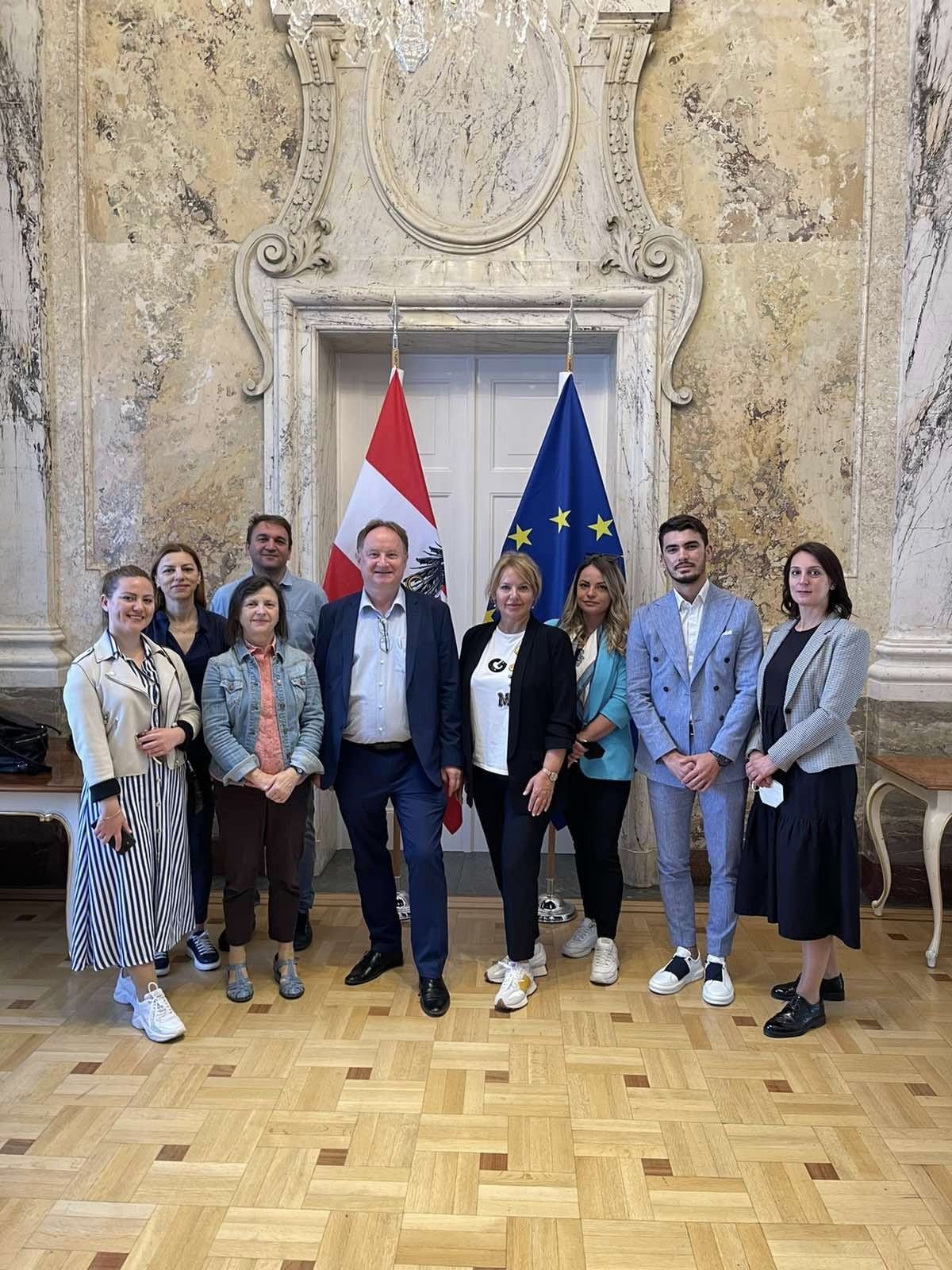Во периодот од 12 до 15 септември 2022 година во рамките на „Пилот-проект за Систем за рано предупредување за исчезнати деца“, спроведуван од Новинари за човекови права и управуван од партнер организацијата ЕКПАТ-Австрија, беше спроведена третата студиска посета за размена на искуства за институционални претставници и експерти од земјава.
Студиската група во состав: Александра Радевска – претставник на Новинари за човекови права, Билјана Лалова – главен инспектор во Националната единица за борба против криумчарење мигранти и трговија со луѓе при Сектор за криминалистички истраги, Одделение за сузбивање организиран и сериозен криминал, МВР, Нермина Факовиќ – Министерство за здравство, Моника Чекаловиќ – Социјален работник во ЈУ за згрижување деца со воспитно-социјални проблеми и нарушено однесување-Скопје, Лиридон Бафтиџи – директор на Меѓуопштински центар за социјална работа во град Скопје, Лиридона Буши – Министерство за образование и Марјан Делевски – независен ИТ експерт, имаше можност да се запознае со институционалната страна на социјалниот систем во Австрија, активностите на општинските и полициските структури, со работата на невладините организации во областа на правата на децата, поддршката на деца жртви на трговија со луѓе, како и со координацијата на разните чинители во гарантирање на безбедноста и благосостојбата на децата.
Посетата започна со средба со Маг. Харалд Фугер, аташе на Сојузното Министерство за социјални работи, здравство, грижа и заштита на потрошувачите на Австрија кој направи преглед на социјалниот систем во Австрија. Особено интересни за присутните беа фактите дека министерството вложува огромни средства за благосостојба на граѓаните, а нуди и некои посебни мерки за пензионери како рехабилитација и мерката Fit2Work, родителското отсуство, вработувањето на лица со хедикеп, кариерно советување за млади…
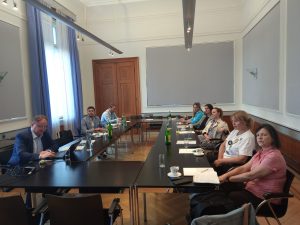 Попладнето повторно во Сојузното Министерство за социјални работи, здравство, грижа и заштита на потрошувачите на Австрија, делегацијата имаше можност да се сретне со Алина Сеел, раководител на одделение за Политика за семејно право и детски права при Сојузната канцеларија, Себастијан Онер од Канцеларијата на Народниот правобранител за деца и млади на Виена и Сабине Скоп од канцеларијата за односи со јавноста при Службите за деца и млади на град Виена.
Попладнето повторно во Сојузното Министерство за социјални работи, здравство, грижа и заштита на потрошувачите на Австрија, делегацијата имаше можност да се сретне со Алина Сеел, раководител на одделение за Политика за семејно право и детски права при Сојузната канцеларија, Себастијан Онер од Канцеларијата на Народниот правобранител за деца и млади на Виена и Сабине Скоп од канцеларијата за односи со јавноста при Службите за деца и млади на град Виена.
Алина Сеел даде преглед на работата на австриската работна група притов трговија со деца и националниот механизам за упатување, а Себастијан Онер се осврна и на медиумскиот дел, односно споделување на информации со медиумите но и со ученици во училишта за правата кои ги имаат преку работилници и проекти, како и важноста од соработка со невладиниот сектор. Тој ги спомена безбедните станови како дел од стратегијата за деца и млади на град Виена. Сабине Скоп спомена дека известување за прекршување на детските права најмногу доаѓаат од училиштата, но и од полицијата по пријави за семејно насилство каде најголем процент од децата се жртви на негрижа, а помал процент на психолошко, физичко но и сексуално насилство.
Особено интересна за присутните беше споделената пракса за работни групи на овие институции, заедно со полицијата, и други експерти во кои на шест недели се дискутира и се координира работата и се споделуваат ресурсите за да се најде најдобро системско решение за секое дете во најскоро време.
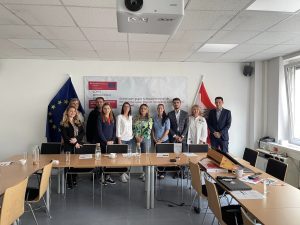 Следниот ден делегацијата го посети Сојузното Министерство за внатрешни работи каде Керстин Кројцер од Криминалистичката разузнавачка служба на Австрија, ја презентираше работата на Оддел 8 – Трговија со луѓе, шверц и посебни истраги, Одделение 8.2.1 – Трговија со луѓе, ЈОО – Заедничка оперативна канцеларија и работната група за трговија со луѓе и деца. Присутните имаа можност да чујат детали за начинот на кој се врши следење на телефонската комуникација, кои се жртви од најголем ризик, работата на линијата која е достапна 24 часа, но и анонимни дојави преку мејл, како и за специфични случаи организирана злоупотреба на деца кои успешно биле решени без сведочење на децата. Отворениот пристап на Министерството за внатрешни работи со невладини организации но и кај јавноста, беа видени како одличен пример за институционална работа што треба да се следи.
Следниот ден делегацијата го посети Сојузното Министерство за внатрешни работи каде Керстин Кројцер од Криминалистичката разузнавачка служба на Австрија, ја презентираше работата на Оддел 8 – Трговија со луѓе, шверц и посебни истраги, Одделение 8.2.1 – Трговија со луѓе, ЈОО – Заедничка оперативна канцеларија и работната група за трговија со луѓе и деца. Присутните имаа можност да чујат детали за начинот на кој се врши следење на телефонската комуникација, кои се жртви од најголем ризик, работата на линијата која е достапна 24 часа, но и анонимни дојави преку мејл, како и за специфични случаи организирана злоупотреба на деца кои успешно биле решени без сведочење на децата. Отворениот пристап на Министерството за внатрешни работи со невладини организации но и кај јавноста, беа видени како одличен пример за институционална работа што треба да се следи.
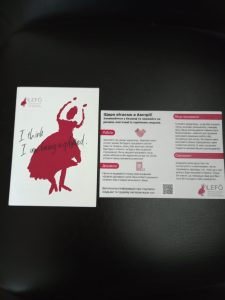
На последниот ден од студиската посета беше посетен и Интервентниот центар за тргувани жени ЛЕФО – ИБФ, каде Изабела Чен ја претстави работата на организацијата која е член на Австриска работна група за борба против трговијата со луѓе, на Платформата на ЕУ за граѓанско општество, Европската НВО Платформа La Strada International, како и на Глобалната алијанса против трговијата со жени. Здружението формирано од и за жени мигранти основано во 1985 година од жени од Латинска Америка кои живеат во егзил во Австрија, е пионер во работата со жени мигранти сексуални работнички и со жени погодени од трговија со луѓе. ЛЕФО е сè уште единствената организација во Австрија која обезбедува широк спектар на советување и поддршка за жените мигранти и се залага за нивните права, а за таа цел соработува со институциите, невладиниот сектор и медиумите. Учесниците беа особено заинтересирани за работата во текот на Ковид-кризата, поддршката која се нуди на жртвите со цел услугите да бидат што е можно подостапни до оние на кои им се најпотребни но и за начинот на кој се вршат интервјуата со жртвите во полиција и за предизвиците во работа со жртви со хендикеп. ЛЕФО своите информации и услуги ги нуди на 8 јазици, а како што посочија минатата година нудела поддршка на 334 жени и девојки од 40 држави.
Попладнето учесниците на студиската средба имаа можност да се запознаат со работата на МЕН ВИА, организација која советува и се грижи за машките жртви на трговија со луѓе од 2013 година, преку презентација и дискусија со директорот на организацијата Манфред Бухнер. На средбата присуствуваше и Астрид Винклер од ЕКПАТ Австрија, партнер организација во проектот. Како што беше посочено, МЕН ВИА е единствена во Австрија специјализирана за заштита на мажи жртви на трговија со луѓе, а за тоа има институционална поддршка. Како што посочи г-н Бухнер трговијата со мажи е најмногу за трудова експлоатација и имаат околу 60 клиенти годишно, а се врши во различни сектори, особено таму каде што има мала плата, а работата е опасна и нездрава: градежништво, гастрономија, чистење, земјоделство. Но, како што посочи, мажите се експлоатираат и како питачи, принудени на проституција или вршење криминални дејствија. 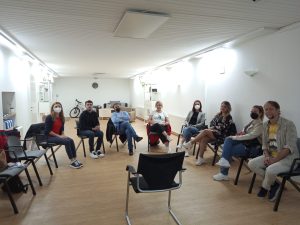 Помошта дадена од МЕН ВИА вклучува совети, безбедно сместување, поддршка во правни, медицински, психолошки и социјални прашања и поддршка во планирањето за иднината. Бухнер присутните ги запозна и со судските случаи кои имале позитивна разрешница, а спомена дека соработката е многу важна и со другите институции и невладини организации, па така од центрите за бездомници кај нив биле испратени 4 лица кои биле жртви на трудова експлоатација. Затоа како што спомена подигање на јавната свест е исто така од голема важност, но и подобрување на системот на казни, бидејќи како што посочи во одредени примери, обвинетите за трудова експлоатација во градежниот сектор наоѓаат начин да продолжат со работа и покрај изречените казни.
Помошта дадена од МЕН ВИА вклучува совети, безбедно сместување, поддршка во правни, медицински, психолошки и социјални прашања и поддршка во планирањето за иднината. Бухнер присутните ги запозна и со судските случаи кои имале позитивна разрешница, а спомена дека соработката е многу важна и со другите институции и невладини организации, па така од центрите за бездомници кај нив биле испратени 4 лица кои биле жртви на трудова експлоатација. Затоа како што спомена подигање на јавната свест е исто така од голема важност, но и подобрување на системот на казни, бидејќи како што посочи во одредени примери, обвинетите за трудова експлоатација во градежниот сектор наоѓаат начин да продолжат со работа и покрај изречените казни.
Сите презентации и дискусии спроведени за време на студиската посета за институционалните претставници беа многу корисни во градењето капацитети за борба против трговијата со луѓе, со фокус на децата и поддршката на засегнатите, како и знаењето за справување со исчезнати лица/деца и пронаоѓање нови начини за подобрување на благосостојбата на децата воопшто. Споделувањето на она што функционира, а исто така и она што не функционира, беше добредојдено како начин да се подобри и да се најдат нови начини да се оди напред, исто така, за да се сфати дека понекогаш напредокот се прави чекор по чекор. Примери за начини за соработка и вмрежување меѓу различни засегнати страни кои работат на благосостојбата на децата, на пример преку одржување на редовни координативни состаноци беа истакнати како добар пример што треба да се следи со цел да се подобри довербата, меѓуинституционалната координација но и заштеди време и ресурси кога тие се ограничени за да се постигне најдобриот интерес на детето во најкус рок.

